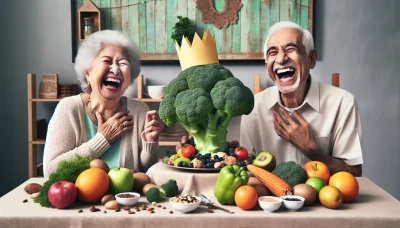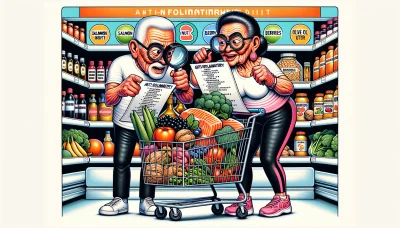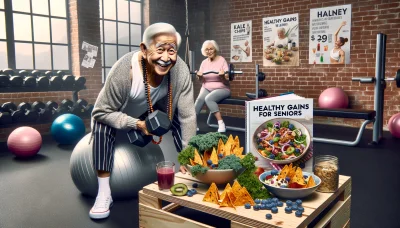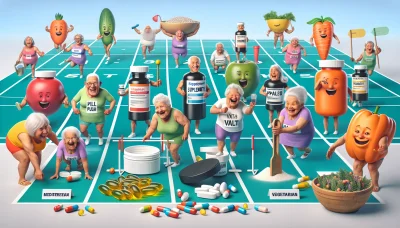Instant energy food for old age Quiz
Test Your Knowledge
Question of
Understanding Energy Needs in Old Age
The Role of Metabolism in Aging
How Metabolism Changes with Age
As people age, their metabolism naturally slows down. This is due to a decrease in muscle mass and hormonal changes. The body becomes less efficient at processing food into energy, leading to a reduced caloric need but also making it easier to gain weight.
Strategies to Boost Metabolism in Seniors
To counteract the slowing metabolism, seniors can engage in regular physical activity, including strength training to build muscle mass, and eat a balanced diet rich in protein to support muscle health.
Nutritional Requirements for Seniors
Essential Vitamins and Minerals
Seniors need a variety of vitamins and minerals to maintain health and energy levels. Important nutrients include vitamin D and calcium for bone health, vitamin B12 for brain function and energy production, and magnesium for muscle function and sleep quality.
Daily Caloric Intake Recommendations
The daily caloric intake for seniors varies based on activity level, sex, and health status. Generally, older women require about 1,600 to 2,200 calories per day, while older men need about 2,000 to 2,800 calories per day. It's important to focus on nutrient-dense foods to meet energy needs without consuming excess calories.
Hydration and Energy Levels
Importance of Water for Elderly Energy
Hydration is crucial for maintaining energy levels in seniors. Water helps transport nutrients in the body, supports digestion, and prevents constipation. It also plays a key role in regulating body temperature and maintaining kidney health.
Signs of Dehydration in Seniors
Signs of dehydration in seniors include fatigue, confusion, dizziness, dry mouth, and infrequent urination. It's important for seniors to drink fluids regularly, even if they do not feel thirsty, to prevent dehydration.
Best Instant Energy Foods for Seniors
Natural Energy-Boosting Snacks
Benefits of Nuts and Seeds
Nuts and seeds are excellent sources of healthy fats, proteins, and fiber. These nutrients are essential for maintaining energy levels throughout the day. Including a variety of nuts and seeds in your diet can also support heart health and provide essential vitamins and minerals.
Quick and Healthy Fruit Options
Fruits are nature's ready-made snacks packed with vitamins, minerals, fiber, and water. They provide a quick energy boost while also keeping you hydrated. Options like bananas, apples, and berries are particularly beneficial for seniors due to their ease of consumption and nutrient density.
Protein-Rich Foods for Sustained Energy
Lean Meats and Plant-Based Proteins
Lean meats such as chicken, turkey, and fish, along with plant-based proteins like beans, lentils, and tofu, are excellent for maintaining muscle mass and ensuring a steady energy supply. These protein sources are also versatile, making them easy to incorporate into various meals.
Dairy and Dairy Alternatives for Seniors
Dairy products and their alternatives are rich in protein and calcium, which are important for bone health. Options like Greek yogurt, cheese, and fortified plant milks can be beneficial for seniors looking for both energy and nutritional value.
Complex Carbohydrates for Long-Lasting Fuel
Whole Grains and Their Advantages
Whole grains, such as oats, quinoa, and brown rice, provide a steady source of energy. They are high in fiber, which helps with digestion and keeps blood sugar levels stable, preventing energy spikes and crashes.
Starchy Vegetables to Include in Meals
Starchy vegetables like sweet potatoes, squash, and corn are not only delicious but also provide essential nutrients and fiber. These vegetables can help maintain energy levels and support overall health.
Planning a Balanced Diet for the Elderly
Sample Meal Plans for Optimal Energy
Breakfast Ideas for a Strong Start
- Oatmeal topped with fresh berries and a sprinkle of walnuts
- Whole grain toast with avocado and poached eggs
- Smoothie made with Greek yogurt, spinach, banana, and a dash of honey
Lunch Options to Avoid Midday Slump
- Quinoa salad with cherry tomatoes, cucumber, feta cheese, and olive oil dressing
- Grilled chicken breast with steamed broccoli and brown rice
- Lentil soup with a side of whole-grain bread
Importance of Meal Timing and Frequency
Regular Eating Schedule Benefits
Maintaining a regular eating schedule helps stabilize blood sugar levels, improves metabolism, and prevents overeating. It's particularly beneficial for the elderly to eat at consistent times to maintain their energy levels throughout the day.
Healthy Snacking Habits
Incorporating healthy snacks between meals can aid in keeping energy levels stable. Opt for snacks like almonds, carrot sticks with hummus, or a piece of fruit to sustain energy until the next meal.
Adapting Diets to Specific Health Conditions
Heart-Healthy Foods
- Salmon and other fatty fish rich in Omega-3 fatty acids
- Leafy green vegetables like spinach and kale
- Whole grains, such as oatmeal and brown rice
- Nuts, especially almonds and walnuts
Diabetic-Friendly Meal Ideas
- Chicken or turkey salad with lots of fresh vegetables, dressed with vinaigrette
- Stir-fried tofu with mixed vegetables and a side of quinoa
- Beef stew made with lean cuts of meat, carrots, peas, and small portions of potatoes
Supplements and Energy Levels in Old Age
When to Consider Supplements
- Dietary Gaps in Senior Nutrition
- Consulting Healthcare Providers on Supplements
Popular Supplements for Energy
- B-Vitamins and Their Role in Energy Production
- Omega-3 Fatty Acids and Brain Health
Potential Risks of Over-Supplementation
- Interactions with Medications
- Recommended Dosages and Safety
Physical Activity and Its Impact on Energy
Exercise Routines for Elderly Individuals
- Low-Impact Workouts for Stamina Building
- Strength Training to Enhance Muscle Function
Balancing Exercise with Nutrition
- Pre-Workout Meals and Snacks
- Post-Workout Recovery Foods
Overcoming Barriers to Physical Activity
- Dealing with Mobility Issues
- Finding Motivation and Support
Mindful Eating Practices for Seniors
Understanding Hunger and Fullness Signals
- Recognizing Appetite Changes with Age
- Mindful Eating Techniques to Enhance Satisfaction
The Role of Diet in Cognitive Function
- Brain Foods that Promote Mental Clarity
- Preventing Cognitive Decline Through Nutrition
Emotional Eating and How to Manage It
- Identifying Emotional Triggers
- Healthy Alternatives to Comfort Foods
Addressing Common Dietary Challenges in Old Age
-
Difficulty Chewing and Swallowing
- Soft Food Ideas for Easy Consumption
- Preparing Nutrient-Dense Smoothies and Soups
-
Loss of Appetite and Its Nutritional Implications
- Enhancing Flavor Without Excess Salt or Sugar
- Encouraging Small, Frequent Meals
-
Navigating Food Intolerances and Allergies
- Identifying and Avoiding Problematic Foods
- Alternative Sources of Essential Nutrients












